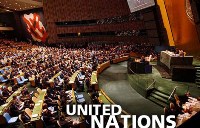UN rights council session ends in controversy
 Geneva - The United Nations Human Rights Council ended its winter meetings on Friday, after passing a host of resolutions in the final days of the four week session, with some, like on the question of defamation of religion, of a controversial nature.
Geneva - The United Nations Human Rights Council ended its winter meetings on Friday, after passing a host of resolutions in the final days of the four week session, with some, like on the question of defamation of religion, of a controversial nature.
Among the issues discussed and voted on were the rights of people with disabilities, child rights, the right to food and the matter of human rights and climate change.
The council adopted 16 reviews held in recent months of states' human rights record, as part of the Universal Periodic Review mechanism, introduced two years ago.
Under the system, each UN member state will have to appear once every four years before the council, defend the rights situation in their country and propose what it will do to further protect human rights.
So far, 64 states have been reviewed.
"No one country can consider that it has a perfect human rights record," said Martin Ihoeghian Uhomoibhi, a Nigerian diplomat and the current president of the council. He has called the review system "revolutionary" while admitting that there was still room for improvements.
Many of the less controversial issues during the session were adopted by consensus by the 47 member states of the council, though others required votes, in some cases highlighting global political alliances and differences.
Two proposals were put forth on religion and human rights, one by the Organization of the Islamic Conference condemning defamation of religion and another by Western nations on combating discrimination on a religious basis.
Both resolutions passed but the Muslim states did not vote yes on the discrimination resolution while others, mostly Western states, expressing concern over freedom of expression, would not support the defamation text.
Uhomoibhi told reporters afterwards that the issues were a "contemporary challenge we cannot run away from."
The question, he said, was "how to best enjoy freedom of expression while combating hatred."
There was a need to find common ground on the matter, Uhomoibhi said, adding that the issue of religion and human rights would remain pertinent in the upcoming years.
Meanwhile, a resolution on the human rights situation in North Korea was passed but several states, including China, Cuba and Russia voted against the motion.
Earlier in the session, the council member and observer states heard a report by a UN appointed special expert on the isolated country, which slammed government policy regarding human rights. He focused much of his report on the high levels of food insecurity in North Korea, which he said was at least partially a man-made problem.
Similarly, a resolution on Myanmar's human rights situation needed to be heavily altered at the last moment, toning down the language, so it could go through.
When it came to the Palestinian question, some lines were drawn. While all council members, with the notable exception of Canada, voted for a resolution against Israeli settlements in the West Bank, the Jewish State's armed responses were a more divisive matter.
Western states, besides Switzerland, voted against or obtained on a resolution about human rights violations resulting from Israeli military acts in the Palestinian territories.
Uhomoibhi said the council was in the final stages of putting together a fact finding team to carry out a mission delegated during a January special session on the situation in Gaza, which would be announced in the upcoming days.
He said the team would consist of "credible" experts who would be "sensitive to the issues." Uhomoibhi added that his goal was to have a mission which would be "fair, equal and balanced" to all sides.
Richard Falk, the UN's rights expert on the Palestinian territories, was not allowed into Israel when he attempted to enter last year, and Uhomoibhi said he could not guarantee the new team would be treated differently. (dpa)